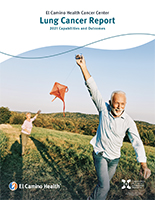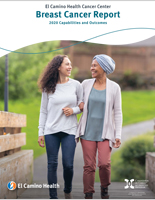Breast Cancer
請點擊此轉換成中文
According to the American Cancer Society, about 1 in 8 women (12 percent) in the U.S. will develop breast cancer during her lifetime. In addition, more than 2.8 million breast cancer survivors are currently living in the U.S., including women still being treated and those who’ve completed treatment.
Breast cancer is the second leading cause of cancer death in women, exceeded only by lung cancer, according to the American Cancer Society. These rates are declining, however, thanks to earlier detection through screenings, increased awareness and improved treatment.
Our breast cancer specialists are attuned to the physical and mental toll a diagnosis of breast cancer can take on you and your family. At El Camino Health, we work to relieve your fears not only with compassionate care, but with the most advanced diagnostic tools and the leading treatment approaches.
We put together a treatment plan that's right for you, with plenty of support for you and your loved ones. We offer you hope for a cure, exceeding national benchmarks in breast cancer five-year survival rates. Our relentless pursuit of options and answers and our personalized approach help us achieve higher cure rates for early-stage cancers. We’re able to prolong life while maintaining quality of life for advanced stages of breast cancer.
Early Detection and Prevention
Early stages of breast cancer usually don’t cause pain and may not cause any symptoms. However, if you notice a lump or changes in color or skin texture in your breast, nipple or underarm, consult a doctor.
Early Detection
To detect cancer in its earliest stages, we recommend a three-step plan for preventive care:
- Perform breast self-exams.
- Have a doctor or other medical provider routinely check your breasts for abnormalities.
- Get a screening mammogram.
As a way of giving back to the community, El Camino Health offers free mammograms and diagnostic screenings to women who qualify for our program.
Our High-Risk Breast Program helps identify, track and counsel women who are at high risk for breast cancer. We provide a risk assessment to every woman who comes for a screening mammogram to identify women at higher risk.
Prevention
Our Cancer Center supports the American Cancer Society’s recommendations for lowering the risk of breast cancer, which include:
- Exercise. A study by the National Institutes of Health Women’s Health Initiative found that briskly walking 1.25 to 2.5 hours a week can reduce breast cancer risk by up to 18 percent.
- Limit alcohol consumption. The more alcohol you drink, the more your risk of breast cancer increases.
- Maintain a healthy weight after menopause. Being overweight or obese and having more fat tissue after menopause can increase your chance of getting breast cancer by raising estrogen levels.
- Avoid combined hormone therapy for menopausal symptoms. Taking both estrogen and progesterone can increase breast cancer risk, but taking estrogen alone has not shown to have an effect.
- Avoid smoking and secondhand smoke. Although a definite link hasn’t been found between cigarette smoke and breast cancer, the surgeon general’s office says evidence suggests a link between the two.
Diagnosis
El Camino Health’s cancer program has number of diagnostic tools to identify and precisely pinpoint tumors, even at the earliest stages.
Regular screening mammograms can be one of your most effective defenses against breast cancer. According to the National Cancer Institute, when breast cancer is found early and is still localized, the relative survival rate at five years is up to 96 percent.
The Lurie Women's Imaging Center at El Camino Health offers digital mammography, which can detect early and highly curable cancers too small to be felt. Our computers actually aid detection and give our radiologists a "second pair of eyes."
If the mammogram shows a lump, an abnormal area or other changes in the breasts, your referring doctor will likely order a follow-up diagnostic test such as a whole breast ultrasound, MRI and biopsies to confirm or rule out a diagnosis of breast cancer.
Women with dense breast tissue (less fatty tissue and more gland tissue) have a higher risk of developing breast cancer. The dense tissue makes it more difficult for radiologists to detect breast cancer on a mammogram. Your doctor may recommend additional screening, such as MRI or ultrasound, to detect cancer as early as possible.
Treatment
The breast cancer treatment you and your doctor choose depends on the stage of your disease — how serious or advanced it is — as well as factors such as the size of the tumor in relation to the size of your breast, the results of lab tests, and your age and general health.
Breast surgeons, medical oncologists and radiation oncologists in El Camino Health’s cancer program work together to develop a personalized care plan for you.
Surgery is the most common treatment for breast cancer, but chemotherapy and radiation therapy can be effective alone or in combination with surgery. Your doctor will explain your options, comparing the benefits and risks.
Breast Conservation Surgery (Lumpectomy)
With a lumpectomy, your surgeon removes only the cancer and leaves the breast. Sometimes a biopsy serves as a lumpectomy, if your surgeon removes the whole lump during the biopsy procedure.
Mastectomy
During a mastectomy, your surgeon removes one or both breasts. In some cases, the surgeon also removes lymph nodes under your arm. Studies have shown equal survival rates for breast conservation surgery (with follow-up radiation therapy to destroy stray cancer cells) and mastectomy for early stages of breast cancer.
Radiation Therapy
Our radiation therapy team offers the latest tools available to deliver high-energy radiation beams to disable cancer cells’ ability to reproduce. Most women receive radiation therapy after breast conservation surgery to destroy any remaining cancer cells in the breast. In some cases, we give radiation therapy following mastectomy, depending on the size of the tumor and other factors. If the tumor is large or difficult to remove, your doctor may recommend radiation therapy before surgery to shrink the tumor.
Stereotactic radiosurgery and adaptive radiation therapy are sophisticated treatment methods that send radiation beams to the tumor very precisely to allow higher doses in fewer treatment sessions than with traditional radiation therapy.
We also utilize the Calypso® 4-D Localization System, where three tiny beads are inserted into the tumor to send radiofrequency signals to the radiation machine, thus allowing your medical team to track the tumor’s position in real-time.
In addition, we offer brachytherapy, in which our radiation oncologist implants high-dose radiation seeds to shrink or destroy the tumor.
Chemotherapy
We generally use a combination of chemotherapy (anticancer) drugs, which may be given as pills or by injection into a vein. The drugs enter your bloodstream and travel throughout the body, affecting cancer cells, as well as other rapidly dividing cells in the body. Side effects depend mainly on the specific drugs and the dose. Most of our patients receive chemotherapy at the Cancer Center infusion center in the Oak Pavilion on our Mountain View campus.
At El Camino Health Cancer Center, we aggressively treat not only your cancer but the side effects of chemotherapy. We respond quickly to give you anti-nausea and pain medication, as well as intravenous hydration. By managing your symptoms, we can keep your treatment course on track for maximum effectiveness.
Targeted Therapy
El Camino Health Cancer Center is unique among community hospitals in using targeted therapy to create a unique combination of drugs to combat your specific type of breast cancer. We study a sample of your tumor in a lab to analyze the proteins and chemicals that make up the tumor. Then, we use current data to decide which drugs will have the maximum effect in eliminating the cancer.
Hormone Therapy and Biological Therapy
Certain types of breast cancer respond well to hormone therapy, which aims to prevent the growth or recurrence of breast cancer by managing estrogen levels in the body. Biological therapy increases the body’s natural ability to fight cancer.
Complementary Therapies
We offer therapies that complement care and promote healing, such as lymphedema therapy (to relieve fluid retention and swelling in the lymph nodes following surgery), acupuncture and massage.
In addition to advanced therapies, El Camino Health offers a variety of specialized services, support and assistance to address the psychological, emotional and spiritual needs of you and your family members throughout treatment and recovery.
Clinical Trials
The El Camino Health Cancer Center works with other medical centers and the National Cancer Institute to offer patients the opportunity to participate in ongoing clinical trials. Ask your doctor about how to participate in a clinical trial.
Breast Reconstruction Program
Breast reconstruction refers to a variety of plastic surgery procedures to restore the breast's shape, appearance or symmetry following mastectomy or lumpectomy. Today's advanced approaches to breast reconstruction provide women with less invasive options, better scar placement and improved cosmetic results.
At El Camino Health, our breast reconstruction surgeons are committed to being on the forefront of new techniques and advancements.






